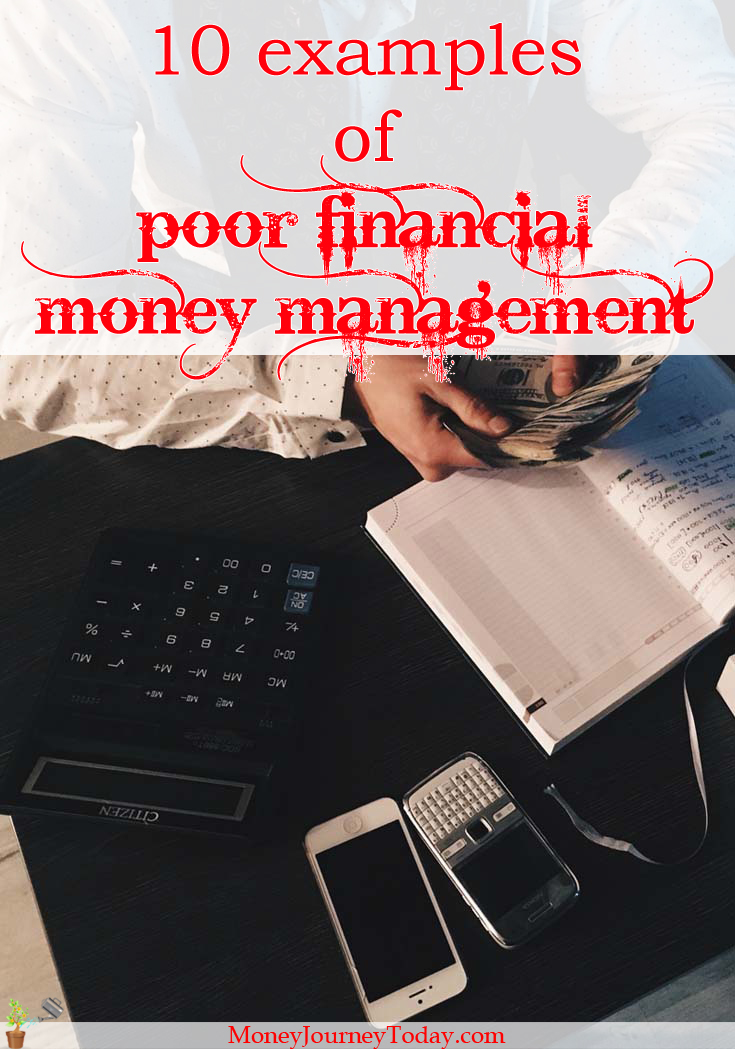Poor financial money management could lead to serious budget and lifestyle consequences.
Whether you’re on a low income or earn big, not being able to manage your finances will probably bury you in debt.
Financial money management might seem complicated, especially for young adults who’re just starting to learn what’s it like to earn a salary and have expenses.
Making mistakes in the first few months you become financially independent is definitely ‘allowed’. Otherwise, how will you learn?
But making the same bad choices over and over again can really lead to a budgeting disaster later.
And there’s nothing worse than finding yourself covered in debt and unable to save for your future plans or retirement.
10 examples of poor financial money management

Not keeping a budget
Where does all your money go?
Keeping a budget isn’t fun for everyone, but it’s necessary.
It’s important to keep track of your expenses, so you’ll know exactly how much you earn and how much you spend and how.
It’s a very common mistake to think you only spend ‘serious’ money on rent and 2-3 bills.
The truth is, you also spend money on food, clothing, the coffee you pick up on your way to work and who knows what else. All these are expenses that you need to track.
Otherwise, you’ll only find yourself with too much month at the end of your money!
Paying bills late
Are you into the habit of paying bills after their due date?
Utility bills, and any other type of bills for that matter, have a due date for a reason.
Not paying bills on time, or skipping payments altogether, could lead to serious penalties that will come out of your paycheck.
Not only that, but missed payments can also affect your debt payment history.
Maybe paying a small percentage of penalties doesn’t seem like a terrible thing, but do it too often and your credit score will suffer.
Not saving money
Since we’re on the very topic of poor financial money management, not saving money on a regular basis is by far the most alarming consequence.
Hypothetically speaking, what if you lose your job?
Or suddenly you fall ill. How will you manage to live for a few months before you get back on your feet?
There are lots of other reasons you should start saving money as well.
Saving money for retirement should be a priority.
Putting money aside for your next vacation sounds like a good plan too.
How about saving for a large purchase, like a new laptop or even a car?
Why should you go into debt if you can pay cash?
Buying what you want instead of what you need
Having more shoes or clothes that you would ever wear.
Exchanging your car for a new one after only 3 years.
Buying the latest iPhone with your old one still working.
Does this sounds familiar?
If you’re looking to save money and make the right financial decisions for you and your family, you’ll have to learn the difference between what you want and what you actually need.
Just think about how much money you’d waste on new car payments if your old one is still in great shape. Or how much money you would save if you wouldn’t buy a new phone every few months.
Impulse purchases
Impulse purchases can have a serious negative effect on your finances.
You might not notice it right away, because it’s usually small things we impulse buy.
Maybe you’ve gone shopping once or twice on an empty stomach and noticed you bought more items than you originally planned.
However, impulse buying might not be so ‘innocent’.
Limited sales, special offers or big flashy signs telling you how much you would save if you made a purchase right away can seriously affect your budget.
Getting into debt
Needless to explain, getting into debt is the worst way to save money.
If you can buy something with cash, go for it.
You’ll save yourself from paying high interest rates and have your purchase owned by the bank until you pay it in full.
Borrowing money
If you need to borrow money, it means you’re not able to rely on your own finances.
Well, that doesn’t sound good!
Whether you’re borrowing money from friends & family or you just need a payday loan, you’re still in debt. And if you don’t plan on paying the money back, you’ll either be contacted by debt collectors or you’ll lose the friendship of people who trusted you.
If you need a quick money fix, try to downsize or earn something on the side.
Borrowing money, even short term, is not a good financial decision.
Keeping up with the Joneses
One of the most financially irresponsible choices one can make is keeping up with the Joneses.
Many are into the habit of showing off with their new car, expensive vacations, the latest Smart TV they just bought.
These are standards too, who is anyone to judge the lifestyle of other people?
However, trying to keep up or even outdo your neighbors if definitely a poor financial choice.
Stick to what you can afford and don’t feel pressured by appearances.
Being too stingy
Many think they’re saving money by making irrational financial decisions.
Some buy cheap car fuel from unreliable sources and end up destroying their car engine.
Others buy food that’s about to expire because it’s cheaper, and risk getting sick.
Saving money is one thing, being stingy and selfish is a totally different story!
Learn the difference between the right budgeting decisions and the ones that could lead to nasty consequences.
Not learning about money management
The fact that you’re reading a personal finance article about financial money management is a great sign! But don’t limit yourself to just this.
Learn more about trading, stocks, FXTM and how to invest your money wisely. Apply what you learn and make it a habit!
In a short while, you’ll see how you’ll come up with new ideas on how to save more and find your own way to become financially independent!
Money doesn’t bring happiness, but financial security does.

I know a lot of people who mistake price for cost. They’ll travel miles for a small discount, not thinking that time IS valuable, so is car fuel etc. Having an addiction (smoking comes to mind) can also bring in a lot of money issues.
[…] Many financial experts do not have a lot of hope for millennials. They believe that millennials do not know how to manage finances. […]
[…] you’re no doubt aware, managing your finances is rarely ever easy. This is particularly true if you’re burdened by debts, or the bills begin to […]
[…] This article will run through some of the most effective things you can do to help you prevent debt from reoccurring. When you make a commitment to yourself, your loved ones and make an earnest effort to change, great things happen. Alongside these proven actions, you will be well on your way to better money management. […]
[…] there is hope. Whether your financial problems resemble a mountain or a small peak, doing something about it is never […]
[…] already developed good money habits, there’s only one thing left to do: maintain them! Poor financial money management only leads to budget troubles and lifestyle […]
[…] no secret that poor financial money management leads to suffering the consequences of a bad credit […]
[…] because of the wrong choices made by the owners. These wrong decisions lead to wrong investments, wrong finance management, wrong employees, and most times, a cascade of other wrong things follow leading the business down […]
[…] need to think carefully about why they need the loan before agreeing to lend them the money. Not everyone spends money wisely. If the money is to fund a new outfit or a holiday then think twice about your decision. If they […]
[…] 10 examples of poor financial money management – Money Journey Today […]
[…] Many celebrities who used to earn millions and have apparently lived a wealthy lifestyle are actually facing critical financial difficulties now in their close-to-retirement years due to poor financial management. […]
[…] Bad financial planning is probably the worst mistake you can make when investing because the whole point of investing your money is to hopefully do it with the right funds you can afford to lose but also to ensure you make a profit from them if you do end up being successful. If you’re going into investing a property and you don’t know a single thing about how much you need and where you should be spending it, then you’re likely to lose that money due to lacking that knowledge. You need to know exactly what your own finances look like and how much it’s all going to cost when investing in property. […]